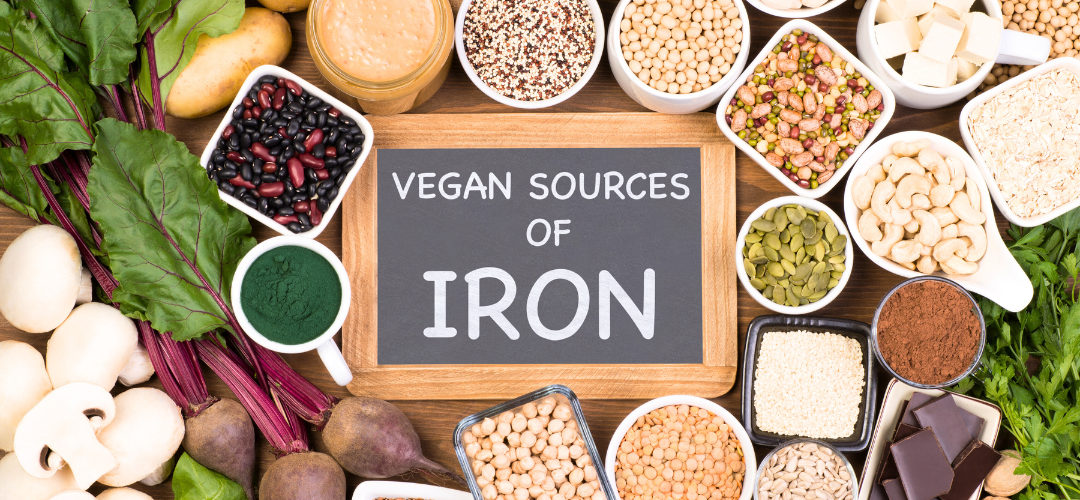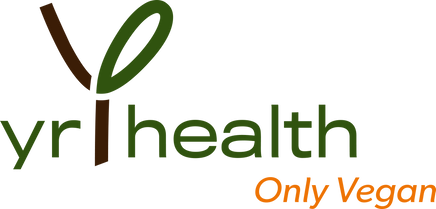on Orders over £25

How to Maintain Proper Iron Levels as a Vegan
Iron is a key nutrient that plays various important roles in your body. It supports numerous organs, systems, and functions that help you feel your best. As a vegan, it can be slightly tricky to get enough iron in your diet as many iron-rich foods are animal based. However, when you carefully balance your meals to include plenty of iron-rich plant based foods and incorporate effective supplements into your routine, low iron levels are easily avoided. This article covers everything you need to know about the various roles iron plays and how to make sure you’re getting enough as a vegan.
What is iron and why is it important?
Iron is an essential mineral that your body needs in order to carry out many different metabolic processes. Most notably, iron is vital to the creation and proper function of red blood cells, as well as a protein called haemoglobin. This is a key protein in red blood cells that carries oxygen all over your body, among other important processes. Iron is also required for the synthesis of another protein called myoglobin, which provides oxygen to your muscles in particular, hence iron’s recognised impact on exercise performance.
All of these processes contribute to the production of energy, allowing you to move through your day with adequate focus and stamina. Without enough iron, these processes cannot occur as they should, leading to the symptoms of iron deficiency. In more serious cases, low iron levels can deteriorate into iron-deficiency anaemia.
Why is iron deficiency common in vegans?
There are two main types of iron; heme iron and nonheme iron. Heme iron is found in animal products like meat and fish and is easily absorbed by the body. Nonheme iron is found in plants, and is not absorbed as well. So, while iron is naturally found in many plant based foods, it’s not the type of iron that the body can absorb in high quantities. This means that even if your vegan diet is high in iron-rich foods, you may still be lacking the ideal amount of iron your body needs to function properly. It’s advisable to get blood tests regularly to keep an eye on your iron levels, allowing you to make meaningful adjustments to your diet and supplementation regimen under the guidance of your doctor.
Common signs and symptoms of iron deficiency
If you are concerned about your iron levels, it’s worth considering whether you’re exhibiting any of the common signs and symptoms of iron deficiency. These include (but are not limited to):
- Fatigue
- Weakness
- Pale skin
- Shortness of breath
- Dizziness
- Irritability
- Inability to focus
- Cold hands and feet
- Heart palpitations
- A rapid heart rate
- Headaches
If you are experiencing any of these symptoms, catching them early and consulting with a healthcare provider can help get you back on the right track. From a simple blood test, your doctor will be able to tell if your iron levels are low, as well as if you’re anaemic, and recommend ways to manage your iron levels moving forward before any potential complications occur.
Daily iron requirements
Now that you know why vegans may be lacking iron and how that deficiency would likely present itself, let’s take a quick look at the NHS guidelines for daily iron intake:
- 8.7mg a day for men over 19 and women over 50
- 14.8mg for women between the ages of 19 and 49
This amount increases for those who only consume nonheme iron, including vegans. So, if you’re following a plant-based diet, some experts advise aiming for approximately 32mg of nonheme iron per day. Our iron supplements contain 20mg of iron, helping to boost your iron intake while leaving room for more in your diet. As not all of the nonheme iron in your food and supplements will absorb, a slightly higher intake makes for a more optimal overall amount of absorbed iron.

Sources of iron for vegans
While it’s a little trickier for vegans to regulate iron levels, it’s far from impossible. There are lots of dietary choices and supplement regimens that can help balance iron levels, allowing you to feel your best.
Dietary sources
Some of the most popular vegan friendly dietary sources of iron include lentils, spinach, chickpeas, quinoa, tofu, beans, peas, nuts, seeds, broccoli, mushrooms, and whole grains. There are also vegan food products that are fortified with extra iron, including options like cereals and plant-based milk. Ensuring your diet includes plenty of natural sources of iron is incredibly important as a vegan as only a portion of nonheme iron will absorb effectively.
Vegan iron supplements
In order to maximise your iron intake, it’s a good idea to ensure there’s plenty of it in your diet while utilising vegan iron supplements to bridge any potential gaps. Our iron supplement, for example, is made with vegans in mind as it contains vitamin C, which helps boost nonheme iron absorption. It also contains vitamin B12, which is another vital nutrient that vegans often lack. Alongside these vitamins and minerals, our unique formula also contains vitamin b6, zinc, copper, and folic acid, helping to maximise and diversify its health benefits.
Enhancing Iron Absorption
As nonheme iron is harder for the body to absorb than heme iron, it’s worth finding ways to boost the absorption rate. For example, when you pair iron-rich foods with vitamin C-rich foods, this can help increase your body’s absorption of nonheme iron. It’s also worth trying to avoid any inhibitors of iron absorption around meal times and when you take your iron supplements. These include tea, coffee, and foods high in calcium.
Key takeaways
Here are the key points to remember about getting enough iron as a vegan:
- Iron is a key mineral that helps with the formation of red blood cells and important oxygen carrying proteins.
- There are two main types of iron, nonheme iron from plants, and heme iron from animal products.
- Nonheme iron is much harder for the body to absorb than heme iron, so vegans often need to consume more nonheme iron via supplements and diet to reach adequate levels.
- If symptoms of iron deficiency arise, consulting a doctor as soon as possible is advised.
- There are many plant based sources of nonheme iron, and their absorption can be enhanced by vitamin C.
- Iron supplements tailored to those following a plant based diet help vegans to regulate iron levels.
- Avoiding foods and drinks that may inhibit iron absorption around meal and supplement times can help promote enhanced iron absorption.
- It’s advisable to get regular blood tests to monitor iron levels and make adjustments to your routine where necessary.

